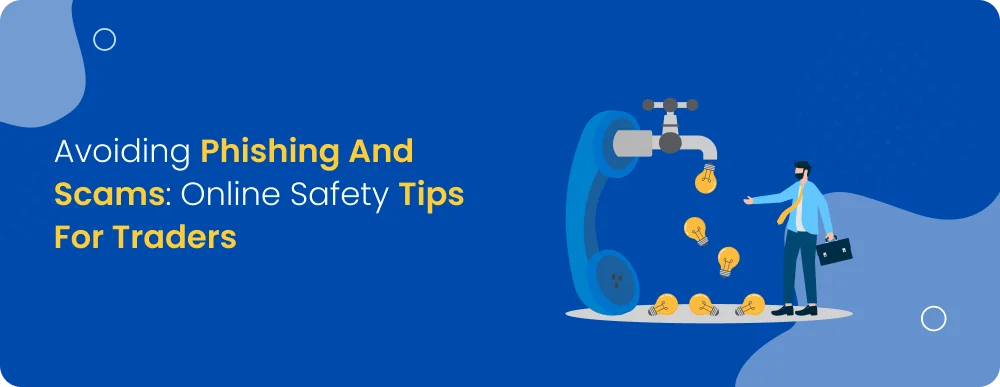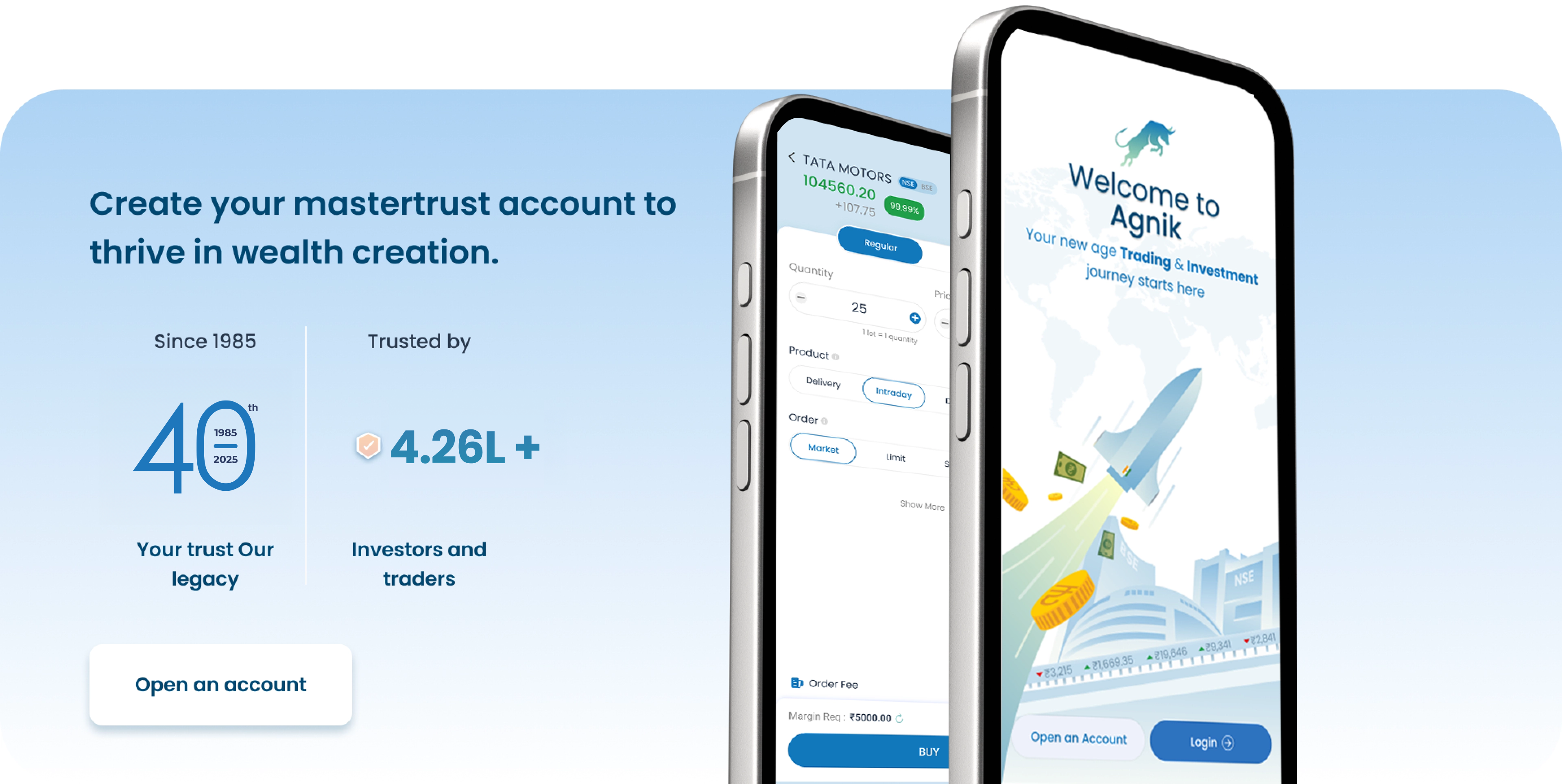Avoiding Phishing And Scams: Online Safety Tips For Traders
Noor Kaur
14 Jul 2025Tags:
Featured
Online share trading is convenient and fast, but without proper safeguards, it can also expose you to cyber threats and fraud. Whether you’re a beginner or seasoned trader, following clear trading safety practices is essential to protect your funds, personal data, and digital identity.
Here’s a tactical guide to help you trade securely and confidently.
Understand the Risks of Online Share Trading
The first step in secure trading is to understand the digital risks associated with it. These include phishing scams, account takeovers, fake broker apps, malware, and SIM-swap attacks.
Tactical tips:
Whether a demat account is safe or not depends on how well you secure your credentials and the platform's reliability.
Be cautious of sudden emails or pop-ups prompting you to trade or log in.
Always check URLs and sender addresses before entering sensitive information.
Suggested Read: Is an Algo Trading App Safe? Security Features You Should Know
Choose a Reputable Trading Platform
Not all platforms prioritise network security and cybersecurity equally. Using an unregulated or unknown app increases the risk of data leaks and unauthorised access.
Tactical tips:
Verify that the platform is SEBI-registered and offers two-factor authentication (2FA).
Look for SSL certification (https:// in the URL) and data encryption standards.
Check for regular platform updates and a transparent support system.
Use Strong Passwords and Enable Security Features
Weak passwords are one of the easiest entry points for cybercriminals. Enhancing account-level security is non-negotiable in secure trading.
Tactical tips:
Use a combination of uppercase, lowercase, numbers, and symbols in your passwords.
Never reuse passwords across platforms—use a password manager if needed.
Enable biometric login, device binding, and OTP-based trade confirmations wherever available.
Monitor Your Account Regularly
Even with all precautions, it’s critical to spot suspicious activity early. Timely detection can prevent major financial loss.
Tactical tips:
Review trade confirmations, account statements, and fund movement logs on a weekly basis.
Set up SMS and email alerts for every login, order execution, and withdrawal.
If you notice unknown trades or login attempts, contact the broker immediately and change your credentials.
Stay Informed About Common Scams
Cybercriminals frequently employ psychological manipulation and social engineering tactics to deceive traders. Phishing, fake trading apps, and “guaranteed returns” scams are common traps.
Tactical tips:
Be cautious of emails or WhatsApp messages claiming to be from brokers or offering tips with unrealistic returns.
Be cautious of links that redirect you to login pages—always use bookmarks or the official app.
Follow updates from SEBI or your broker’s security alerts section to stay ahead of scam trends.
Keep Your Devices and Software Updated
Using outdated software makes your devices vulnerable to malware, keyloggers, and remote access attacks—all serious risks to trading safety.
Tactical tips:
Always install the latest OS updates, antivirus patches, and browser versions.
Enable auto-updates for your secure trading apps and firewall software to ensure optimal performance and security.
Avoid using rooted or jailbroken devices for trading—these weaken the built-in network security and cybersecurity.
Avoid Sharing Sensitive Information
Sharing your login credentials, OTPs, or PAN card details with others—intentionally or unintentionally—can expose your demat account to misuse.
Tactical tips:
Never share screenshots of your trading dashboard or account number on social media or with unverified contacts.
Avoid using public Wi-Fi while accessing trading services—use a VPN if needed.
Educate family members who may have access to your device about the basics of online safety.
Conclusion
Securing your trading activity is not just about technology—it’s about awareness, discipline, and regular habits. From selecting the right platform to monitoring your account and mitigating social engineering risks, these security practices safeguard you in a fast-paced market when using an online trading app.
If you're looking for a trading platform that prioritises both performance and protection, mastertrust offers a robust suite of tools designed with trader safety in mind. Start trading today!
FAQs
How do I know if an online trading platform is safe?
To verify if a platform offers secure trading, check that it is registered with the Securities and Exchange Board of India (SEBI) and holds a valid license. Look for features like two-factor authentication (2FA), SSL encryption, session timeouts, and a clear privacy policy. A trustworthy broker will also offer transparency on charges and have a proven customer support system.
Can someone hack my trading account?
Yes, if basic security tips are ignored—like using weak passwords or accessing your account over unsecured public Wi-Fi—your account can be compromised. However, with proper network security and cybersecurity practices, such as strong passwords, 2FA, and device-level protections, you can minimise the risk.
What should I do if I suspect a scam or fraud?
Immediately report it to your broker and block all trading activity. Next, contact your bank to secure linked accounts. Then, file a complaint with SEBI's SCORES platform. Early reporting can help limit damage and trace malicious activity. Staying alert is key to maintaining trading safety.
Is using a mobile trading app safe?
Yes, most regulated brokers offer apps that support secure trading through encryption, biometric logins, and regular security updates. Still, it’s your responsibility to use strong device-level security and avoid installing the app on jailbroken or rooted phones. Wondering if your Demat account is safe or not? If it's accessed through a secure, verified app with proper safeguards, it generally is.
Should I use antivirus software while trading?
Yes, using updated antivirus software is a basic but essential layer of cybersecurity. It helps protect you from malware, keyloggers, and trojans, especially when accessing your trading platform through a browser or third-party tools.
How can I protect myself from phishing attacks?
Always double-check links before clicking. Phishing emails often mimic genuine communications from brokers. Use bookmarks for login pages, and never enter credentials on unknown websites. For added trading safety, enable email and SMS alerts for every transaction from your demat account.
Noor Kaur
14 Jul 2025Related blogs
Sign up to our newsletter !
Share this article on
Recent articles
Tags:
Open a Demat Account in just 15 minutes !

Click on open
account below

Fill out some
basic details

Upload your
documents

Start trading in
24 Hours *
Commonly asked questions
Is Master Capital Services Limited SEBI registered?
Do you have a mobile app for Trading and Finance Management?
What services does mastertrust provide?
What is the minimum investment required to start trading with your company?
Is my personal and financial information secure with your company?
What is your customer support availability?





